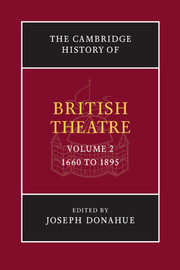Book contents
- Frontmatter
- Part I 1660 to 1800
- Part II 1800 to 1895
- 11 Introduction: the theatre from 1800 to 1895
- 12 Presence, personality and physicality: actors and their repertoires, 1776–1895
- 13 Theatres, their architecture and their audiences
- 14 Stage design from Loutherbourg to Poel
- 15 Theatre and mid-Victorian society, 1851–1870
- 16 Gendering Victorian theatre
- 17 Popular entertainment, 1776–1895
- 18 The Bells: a case study A ‘bare-ribbed skeleton’ in a chest
- 19 The new drama and the old theatre
- 20 1895 A critical year in perspective
- Bibliography
- Index
- References
19 - The new drama and the old theatre
from Part II - 1800 to 1895
Published online by Cambridge University Press: 28 March 2008
- Frontmatter
- Part I 1660 to 1800
- Part II 1800 to 1895
- 11 Introduction: the theatre from 1800 to 1895
- 12 Presence, personality and physicality: actors and their repertoires, 1776–1895
- 13 Theatres, their architecture and their audiences
- 14 Stage design from Loutherbourg to Poel
- 15 Theatre and mid-Victorian society, 1851–1870
- 16 Gendering Victorian theatre
- 17 Popular entertainment, 1776–1895
- 18 The Bells: a case study A ‘bare-ribbed skeleton’ in a chest
- 19 The new drama and the old theatre
- 20 1895 A critical year in perspective
- Bibliography
- Index
- References
Summary
Good work is knocking at the stage doors! Why isn’t it admitted? Why does the actor put the banalities on? When he is his own manager, why not produce things that are worthy of him?
The speaker of these words is Alma King, the actress whom Royce Oliphant — the title character of Leonard Merrick’s theatrical novel The Actor-Manager (1898) – loves but does not marry. Merrick knew the London theatre world from the inside. He, like Oliphant at the novel’s opening, had been a jobbing actor with literary aspirations, and he writes feelingly of the mutual loneliness of two young actors who hoped for more when they entered the profession. Out of work and penniless, Alma has recently understudied the role of Hilde Wangel in Ibsen’s The Master Builder for the Independent Theatre Society. Her vision of aliterary drama chimes with Oliphant’s, and the novel as a whole tests that vision against the realities of the late nineteenth-century theatre. Alma vanishes from the story for a prolonged period, touring to South Africa with a second-rate company and a repertoire of pot-boilers. Oliphant, by contrast, rises meteorically when he takes over the leading role in his own play (based on the notorious case of the Tichborne claimant), marries the beautiful Blanche Ellerton and becomes an actor-manager. ‘Only no Brand, Royce’, Blanche cautions, ‘if you’re going to open the campaign with Brand because you want to play the part, we shall be doomed’ (240). Not yet bold enough to stage Ibsen, Oliphant opts for a poetic play from a French author (Maurice Maeterlinck in the disguise of Sylvain Lacour) ‘laid on an imaginary island, and the period was described simply as “The Past”’ (243). It is a succès d’estime, which Blanche, with her eye on the empty stalls, considers the French for a failure.
- Type
- Chapter
- Information
- The Cambridge History of British Theatre , pp. 405 - 421Publisher: Cambridge University PressPrint publication year: 2004

